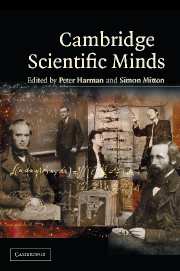Book contents
- Frontmatter
- Contents
- Foreword
- Introduction
- 1 William Gilbert
- 2 William Harvey
- 3 Isaac Newton: Creator of the Cambridge scientific tradition
- 4 William Whewell: A Cambridge historian and philosopher of science
- 5 Adam Sedgwick: A confident mind in turmoil
- 6 Charles Babbage: Science and reform
- 7 Charles Darwin
- 8 Stokes and Kelvin, Cambridge and Glasgow, light and heat
- 9 James Clerk Maxwell
- 10 The duo from Trinity: A.N. Whitehead and Bertrand Russell on the foundations of mathematics, 1895–1925
- 11 Thomson, Rutherford and atomic physics at the Cavendish
- 12 Hopkins and biochemistry
- 13 Charles Sherrington, E.D. Adrian, and Henry Dale: The Cambridge Physiological Laboratory and the physiology of the nervous system
- 14 Hardy and Littlewood
- 15 Arthur Stanley Eddington
- 16 Paul Dirac: A quantum genius
- 17 Alan Turing
- 18 Francis Crick and James Watson
- 19 Mary Cartwright
- 20 Joseph Needham
- 21 Molecular biology in Cambridge
- 22 The discovery of pulsars – prelude and aftermath
- 23 Stephen W. Hawking
6 - Charles Babbage: Science and reform
Published online by Cambridge University Press: 05 June 2014
- Frontmatter
- Contents
- Foreword
- Introduction
- 1 William Gilbert
- 2 William Harvey
- 3 Isaac Newton: Creator of the Cambridge scientific tradition
- 4 William Whewell: A Cambridge historian and philosopher of science
- 5 Adam Sedgwick: A confident mind in turmoil
- 6 Charles Babbage: Science and reform
- 7 Charles Darwin
- 8 Stokes and Kelvin, Cambridge and Glasgow, light and heat
- 9 James Clerk Maxwell
- 10 The duo from Trinity: A.N. Whitehead and Bertrand Russell on the foundations of mathematics, 1895–1925
- 11 Thomson, Rutherford and atomic physics at the Cavendish
- 12 Hopkins and biochemistry
- 13 Charles Sherrington, E.D. Adrian, and Henry Dale: The Cambridge Physiological Laboratory and the physiology of the nervous system
- 14 Hardy and Littlewood
- 15 Arthur Stanley Eddington
- 16 Paul Dirac: A quantum genius
- 17 Alan Turing
- 18 Francis Crick and James Watson
- 19 Mary Cartwright
- 20 Joseph Needham
- 21 Molecular biology in Cambridge
- 22 The discovery of pulsars – prelude and aftermath
- 23 Stephen W. Hawking
Summary
Among Cambridge undergraduates there has long been an élite who have bypassed conventional studies to follow their own paths, usually to the dismay of their tutors, and gone on to make profound contributions to the sciences. Charles Babbage was an early member of this group. When Babbage went up to Trinity in 1810 Cambridge science was in a poor state. Experimental science barely existed, while mathematics languished, hampered by loyalty to Newton's inflexible dot notation for the calculus. The scene cried out for change, but as the transformation developed it became deeply involved with the contemporary political Reform movement.
Babbage and his friends fought for the systematic development of science and its application to commerce and industry on a national scale, but theirs was not the only ideology developing at the time. Against them was the curious chivalric revival which permeated the public schools and the Establishment. It has been observed that the ruling ideas of every age are the ideas of the ruling class, and Babbage and his friends lost the battle. The consequences of this defeat remain the subject of active discussion.
Babbage was born in London, south of the river in 1791. His family came from Totnes in South Devon, bankers who, like many other such families, had formerly been goldsmiths. A precocious mathematician Babbage was already well versed in the Continental mathematical notations when he went up to Cambridge.
- Type
- Chapter
- Information
- Cambridge Scientific Minds , pp. 79 - 93Publisher: Cambridge University PressPrint publication year: 2002
- 1
- Cited by



